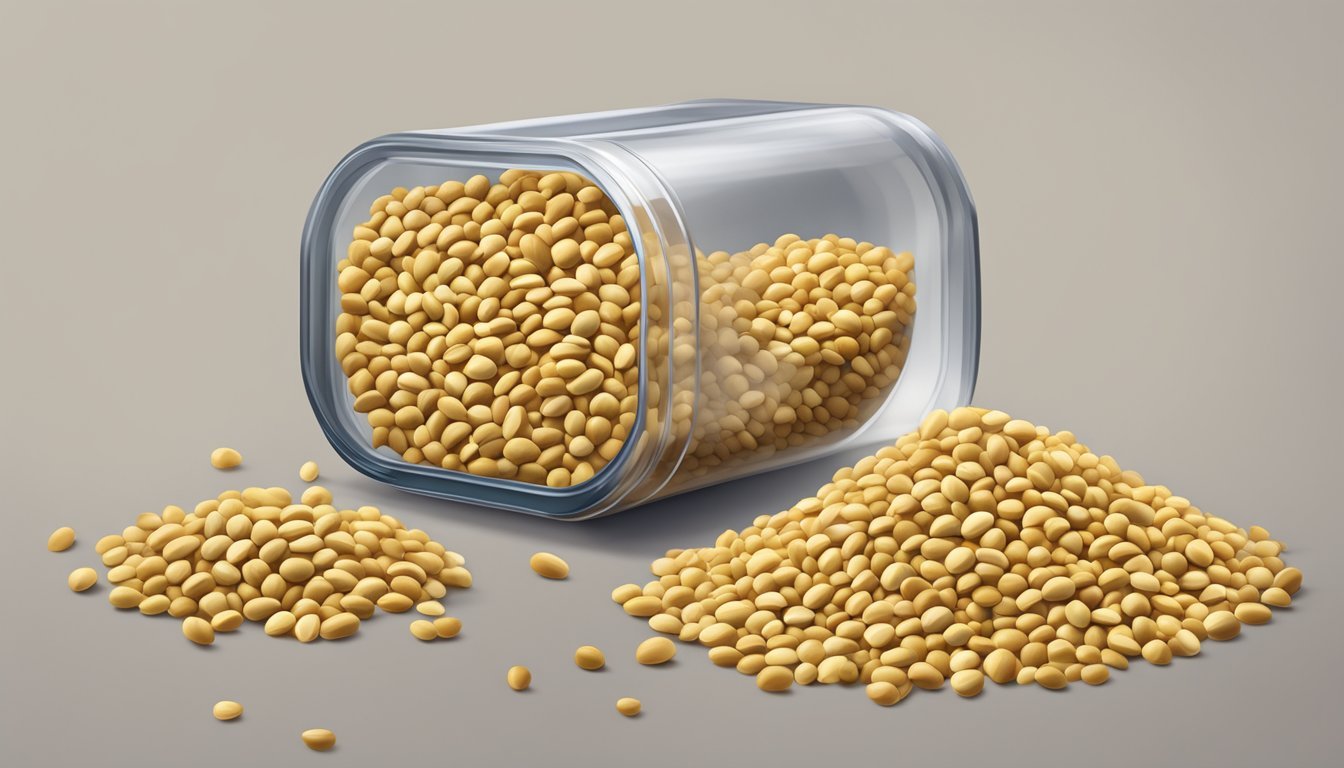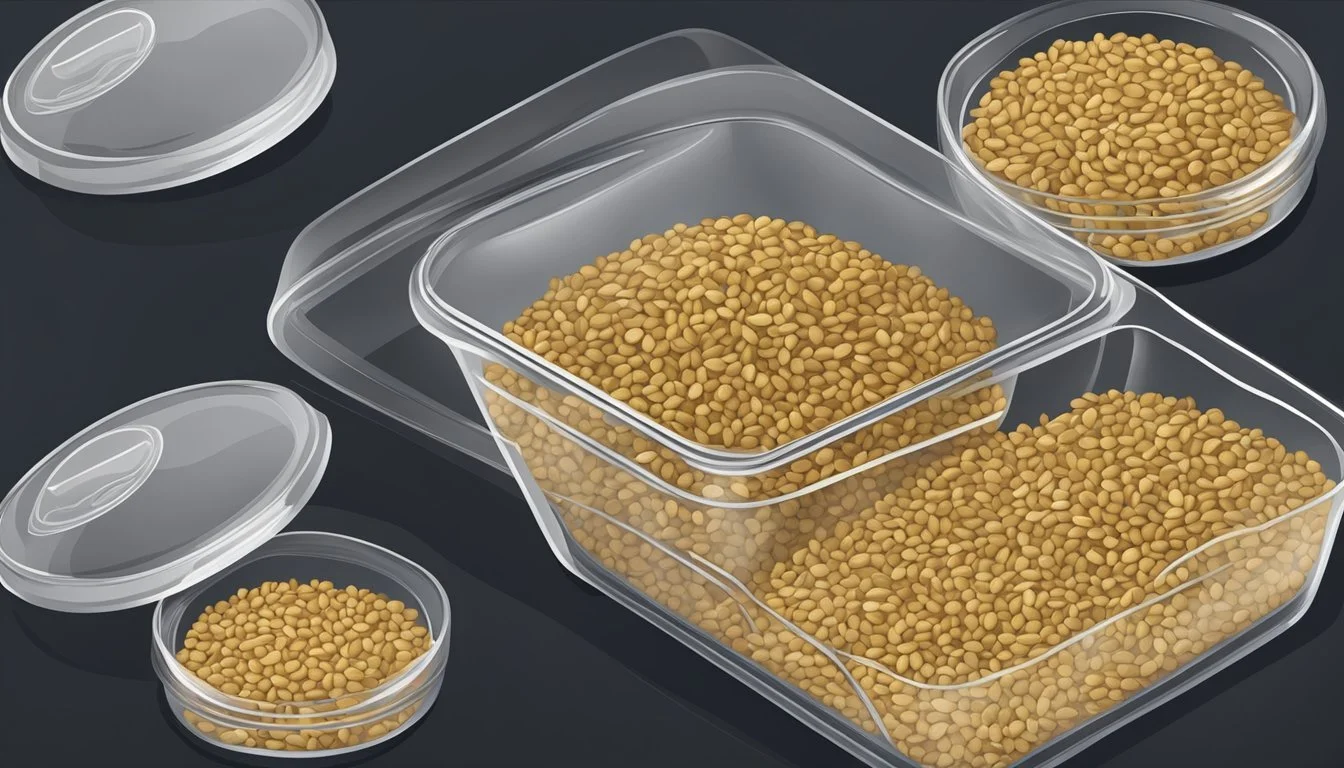How Long Do Fenugreek Seeds Last?
Shelf Life and Storage Tips
Fenugreek seeds (how long do seeds last?) are a staple in many global cuisines, valued not only for their culinary contribution but also for their health benefits. They're known to have a long shelf life, which makes them a convenient ingredient to keep in stock. Proper storage is key to maintaining their freshness and potency over time.
The longevity of fenugreek seeds largely depends on how they are stored. When sealed in an airtight container and stashed in a cool, dark place, their quality can be preserved. Expert advice suggests that with these storage conditions, fenugreek seeds can last for up to two years, though it's wise to assess their aroma and flavor before use, especially as they approach or exceed this time frame.
Considering the factors that affect fenugreek seeds, such as humidity, heat, and light exposure, the ideal storage environment minimizes these elements. This careful approach to storage ensures that the seeds retain their distinctive taste and remain suitable for enhancing dishes with their characteristic flavor.
Fenugreek Seeds Overview
Fenugreek seeds are a versatile spice with a rich profile used in both culinary and medicinal contexts. They are derived from the fenugreek plant, which is a member of the legume family, and are prized for their nutrient content and health benefits.
Culinary Uses
Fenugreek seeds hold a prominent place in the culinary world. They are commonly used in spice blends and as a flavoring agent in various cuisines. Their taste has a characteristic bitter yet slightly sweet flavor, and the seeds are often found in dishes such as curries, bread, and chutneys. Fenugreek seeds can be used whole or ground and are sometimes roasted to enhance their flavor.
Medicinal Benefits
The medicinal benefits of fenugreek seeds are well-documented. They are credited with having properties that aid in blood and lymphatic cleansing. Traditionally, fenugreek seeds have been used to assist in digestion, relieve constipation, and treat inflammation. Modern research suggests they may offer health benefits such as lowering blood sugar levels and improving cholesterol.
Plant Profile
Botanical Name: Trigonella foenum-graecum
Family: Leguminosae
Growth Habit: A tender annual that can grow up to two feet in height with a single hollow hairy stem.
Climate: Prefers cool growing conditions.
Fenugreek thrives in full sun and well-drained soil, although it also tolerates a variety of soil types. It has a strong, pleasant aroma and small white flowers, and it produces long, slender, yellow-brown seeds that are the primary source of its culinary and medicinal use.
Storage Guidelines
Proper storage can significantly extend the shelf life of Fenugreek seeds, ensuring that they maintain freshness and flavor. Implementing the best practices in storage is essential for preserving the quality of the seeds.
Airtight Containers
Storing Fenugreek seeds in airtight containers is critical to preventing exposure to moisture, air, and light—all of which can accelerate spoilage. Seeds should be placed in a storage container that is both airtight and opaque to ensure maximum protection.
Ideal Environment
For Fenugreek seeds to retain their quality, they need an ideal environment that is cool, dry, and dark. The optimal conditions for the storage include:
Temperature: Below 40°F
Humidity: Less than 10 percent
A cool, dry place like a pantry or a cupboard away from heat sources and sunlight can provide such an environment.
Refrigeration and Freezing
For long-term storage, Fenugreek seeds may also be kept in the refrigerator or freezer. Refrigeration and freezing help retain freshness for extended periods, ensuring the seeds remain viable for future use. When they are properly stored in these conditions, Fenugreek seeds can maintain good quality for up to 2-3 years. It is essential to use a container that combats humidity when placing seeds in these environments.
Factors Affecting Freshness
Proper storage conditions are crucial for maintaining the freshness and extending the shelf life of fenugreek seeds. Specific factors such as temperature, moisture levels, and the duration of storage play pivotal roles in preserving their quality and aroma.
Temperature and Moisture
Maintaining a cool and dry environment is essential for the longevity of fenugreek seeds. They should be kept away from heat sources as high temperatures can accelerate the loss of flavor and potency. Moreover, moisture is a significant enemy of freshness; it can lead to the growth of mold and a reduction in quality. Ideally, fenugreek seeds should be stored at a consistent temperature with low humidity levels to prevent spoilage.
Recommended Storage Conditions:
Temperature: Cool (below room temperature)
Humidity: Low (avoid damp areas)
Storage Duration
Fenugreek seeds can last up to 2-3 years if stored properly. The length of time that fenugreek seeds retain their optimum quality depends on how well they are protected from environmental factors that hasten degradation. The seeds should be placed in an airtight container to minimize exposure to air and further preserve their aroma and quality over time.
Optimal Storage Lifespan:
Up to 2-3 years (with ideal storage practices)
Signs of Spoilage
One should be aware of the signs that indicate fenugreek seeds may no longer be fresh. Spoiled seeds may exhibit a lack of aroma, a musty smell, or visible signs of mold. If there is any doubt about the seeds' condition, it is best to err on the side of caution and avoid using them, as they might not deliver the desired flavor or could pose potential health risks.
Common Indicators of Spoilage:
Loss of aroma
Musty or off odors
Visible mold growth
Using Fenugreek Seeds
Fenugreek seeds are a versatile culinary ingredient known for their distinct nutty flavor, which can add depth to a variety of dishes. They are prominently used in Indian cuisine but also have applications in other culinary traditions.
Cooking with Fenugreek
Integration in Dishes: Fenugreek seeds are often an essential component in spice blends such as garam masala, (how long does garam masala last?) contributing to the complex flavor profile of curries and soups. They should be added towards the end of cooking to retain their aroma and taste.
Taste Profile: The seeds impart a slightly bitter yet sweet flavor similar to a blend of celery and maple. To utilize their flavor fully, they are commonly dry toasted, which enhances their aromatic qualities before being powdered or used whole.
Preparation Techniques
Toasting and Grinding: For optimal flavor, fenugreek seeds can be dry roasted in a pan until their color deepens and they release a strong aroma. Post toasting, they can be ground into powder using a spice grinder.
Preparation Step Description Toasting Heat seeds in a dry pan until fragrant. Grinding Grind the toasted seeds to a fine powder.
Sprouting: Fenugreek seeds can be sprouted to use in salads, enhancing the dish with a crunchy texture and a milder flavor profile than the dried seeds. They require soaking in water and a few days for germination.
Substitutes
Finding Alternatives: When fenugreek seeds are unavailable, one can substitute them with mustard seeds (how long do mustard seeds last?) for a somewhat similar sharpness, or use curry powder as a complex blend that often contains fenugreek among other spices.
Mustard Seeds: A common substitute that adds a similar pungency but lacks the maple-like sweetness of fenugreek.
Curry Powder: Already a component in many curry powder blends, fenugreek's absence can be mitigated by the mixture of other spices present.
Growing Fenugreek at Home
Fenugreek, a versatile herb used in many cuisines, can be easily cultivated in home gardens. To achieve a successful crop, growers should focus on proper planting techniques, diligent care, and timely harvesting to maintain seed viability.
Planting and Care
Planting fenugreek requires choosing a location with full sun to partial shade and ensuring the soil is rich by incorporating compost or aged manure. The soil pH should ideally be between 6.0 and 7.0. For best results:
Sow seeds at a depth of ½ inch.
Space the seeds about 2-3 inches apart.
The soil should be kept moist but not waterlogged to encourage germination.
Thin seedlings to prevent overcrowding once they reach 2 inches in height.
Watering needs to be consistent but moderate—overwatering can lead to root rot. Fenugreek also thrives when the soil is kept enriched; therefore, a mid-season side dressing with compost can be beneficial. For optimal growth, incorporate crop rotation into your garden practices to deter soil depletion and reduce disease risks.
Harvesting Seeds
Fenugreek seeds are usually ready for harvest when the plant's pods turn yellow and the seeds within develop a hard outer shell. To harvest:
Wait for the pods to mature and dry on the plant.
Pick the pods and thresh them to extract the seeds.
Dry the seeds thoroughly before storing to maintain their viability.
The seeds can be used for culinary purposes or saved for propagating future plants. If growing for microgreens, harvest the leaves when they are young and tender, usually about 2-3 weeks after planting.
Common Pests and Diseases
Fenugreek plants may encounter issues like aphids, powdery mildew, and root rot. Manage pests and diseases through:
Monitoring plants regularly and using neem oil or insecticidal soap as needed for aphids.
Ensuring proper air circulation and soil drainage to combat fungal diseases like powdery mildew.
Avoiding excess moisture around the base of the plants to prevent root rot.
Implementing these strategies helps maintain a robust fenugreek plant, ensuring a bountiful harvest.
Companion Planting and Crop Rotation
In the cultivation of fenugreek, an annual leguminous herb, companion planting and crop rotation are vital practices to optimize growth and seed longevity. These techniques not only improve the health of fenugreek but also benefit the garden ecosystem as a whole.
Beneficial Companions
Fenugreek thrives when grown alongside certain vegetables, herbs, and legumes which are compatible due to their mutual benefits. They provide a symbiotic environment that can improve growth and protect against pests.
Vegetables: Fenugreek does well with vegetables like spinach, carrots, and tomatoes. These companions help create a balanced ecosystem.
Spinach provides ground cover, reducing weeds.
Carrots help to break up the soil without disturbing fenugreek roots.
Tomatoes can benefit from the nitrogen fenugreek fixes in the soil as a legume.
Legumes: Being a legume itself, fenugreek can be rotated with other legumes like beans and peas. Such a rotation supports soil fertility.
Beans and peas share similar nitrogen-fixing properties, sustaining soil health.
Herbs: Aromatic herbs like parsley and fennel are favorable companions for fenugreek.
Parsley can help attract beneficial insects to the garden.
Fennel may deter pests with its strong aroma.
Avoiding Unfriendly Plants
Not all plants are conducive to the growth of fenugreek, and certain species should be avoided:
Alliums: Plants like onions may inhibit the growth of fenugreek, so they should not be planted in close proximity.
Gourds: Although not directly harmful, cucumbers, pumpkins, and squash might overshadow fenugreek due to their sprawling nature.
Leafy Greens: Certain leafy greens such as lettuce and mustard might compete with fenugreek for space and nutrients if not managed correctly.
Root Vegetables: Beets, parsnips, and carrots, if not rotated properly, can lead to soil depletion, affecting fenugreek seed production in successive plantings.
By following these companion planting guidelines and implementing a strategic crop rotation plan, gardeners can maintain healthy soil and optimize their fenugreek seed harvests.
Health and Nutrition
Fenugreek seeds are lauded for their nutrient-rich profile and numerous health benefits. They contain key vitamins and minerals that support various bodily functions.
Nutritional Content
Fenugreek, also known by its Latin name Trigonella foenum-graecum, is a nutrient powerhouse. The seeds are composed of a range of beneficial nutrients. Here is a snapshot of their nutritional makeup:
Protein: Essential for tissue repair and muscle building.
Carbohydrates: Provide energy for daily activities.
Fat: Supports cell growth and hormone production.
Iron: Crucial for oxygen transport in the blood (21% DV).
Manganese: Aids in bone formation and nutrient metabolism (6% DV).
Magnesium: Important for heart health and bone integrity (5% DV).
Nutrient Content Protein 3g Carbs 6g Fat 1g Iron 21% DV Manganese 6% DV Magnesium 5% DV
Health Benefits
The seeds of fenugreek are renowned for their medicinal properties and health applications. Some prominent health benefits include:
Diabetes management: Fenugreek seeds may improve blood glucose and enhance glucose tolerance.
Digestive health: The fiber in fenugreek can aid digestion and relieve constipation.
Cholesterol regulation: These seeds may help in reducing levels of bad LDL cholesterol.
It's important for individuals to consult with healthcare providers regarding correct dosage and to consider existing research when looking at potential health applications.
Safety and Precautions
When it comes to the consumption and handling of fenugreek seeds, safety is paramount. Individuals should be aware of potential allergies and sensitivities. It's also crucial to consider the specific needs of different populations, such as pregnant women, while using fenugreek seeds.
Allergies and Sensitivities
Fenugreek seeds may cause allergic reactions in some individuals. Symptoms can include diarrhea, stomach upset, bloating, and gas. In cases of severe allergy, individuals might experience skin rashes or a drop in blood sugar. Anyone with a known sensitivity to fenugreek should avoid its usage in any form.
Considerations for Special Populations
Pregnant women should exercise caution with fenugreek consumption. While the seeds are commonly used for various health benefits, the effects on pregnancy have not been thoroughly studied. Therefore, it's advised that pregnant women consult with a healthcare provider before adding fenugreek seeds to their diet.









